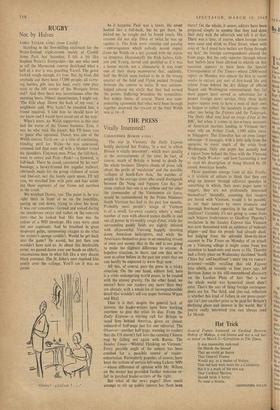RUGBY Not by Halves
JAMES TUCKER writes from Cardiff:
Standing in the five-shilling enclosure for the Wales-Ireland triple-crown match at Cardiff Arms Park last Saturday, I felt a bit like Stephen Potter's firewatcher—the one who used to tell the Murmansk convoy deckhand what a hell of a war it was guarding Yeovil. The game looked rough enough, it's true. But, by God, did anybody out there have 17,000 people, all carry- ing bottles, pile into his back every time play went to the left corner of the Westgate Street end? And then there was incontinence after the morning beers. Others' incontinence, I might say. The little chap. Down the back of my coat,' a neighbour said. Why hadn't he smashed him, a friend inquired. 'I told him he should have let me know and I would have stood out of the way.'
What's more, we Welsh supporters at this spot had the worse of the Dawes business. True, it was he who took the knock, but I'll leave you to guess who agonised. Dawes was one of the Welsh centres. Early on--at a time of continuing, blinding peril for Wales—he was concussed, resumed and then went off with a blanket round his shoulders. Fourteen men. Price, the full-back, went to centre and Pask—Pask 1—a forward, to full-back. There he stood, coroneted by his ears' bandage, a heaVy-framed but angular stalwart, obviously made for the group violence of scrum and line-out, not the lonely open space. I'll tell you, we watched him with pain and fear scald- ing those segments of our frame not numbed in the crush.
We watched Dawes, too. The point is, he was right there in front of us on the touchline, pacing up and down, trying to clear his head. It was our consensus—formed and voiced during the murderous sways and rushes on the concrete tiers—that he looked bad. His face was the colour of a WD envelope. His eyes were open but not cognisant. And he breathed in great desperate gulps, summoning oxygen to do what the trainer's sponge couldn't. Would he get back into the game? He would, but just then you wouldn't have said so. At about this intolerable point, we passed down over our heads an elderly, unconscious man in what felt like a very decent black overcoat. The St. John's men received him gently over the railings. You'll see it was no picnic.
• Glohe! ! • • As it happens, Pask was a tower. He never looked like a full-back, but he got there, he picked up, he caught and he found touch. His coronet did not slip. Once or twice he was up against it. The Irish were running and passing —extravagances which nobody would expect .from the Welsh on a wet ground with the stakes so immense. Occasionally the Irish halves, Gib- son and Young, darted and sparkled as if it was a house match, not a climacteric. It was from one of their sharp manoeuvres that, suddenly, half the Welsh team looked to be in the wrong quarter of the field and Flynn pushed through between the centres to score. It was acknow- ledged among my circle that they had earned the points. Suffering broadens the sympathies. But within limits, of course. There was com- pensating agreement that what we'd been through together deserved the reward of the final Welsh win at 14-8.


































 Previous page
Previous page